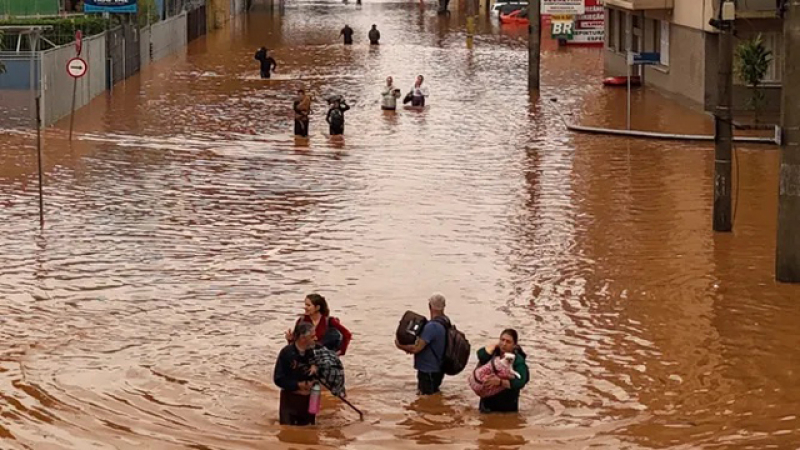- Key in your hands, use it wisely: Prof Yunus tells voters |
- Yunus Urges Voters to Shape a ‘New Bangladesh’ |
- Bangladesh Polls: Campaign Ends as Voters Weigh Pledges |
- Bangladesh Heads to First Gen Z-Driven Competitive Poll |
- EC Lifts Mobile Phone Ban, Bars Photos Inside Booths |
Floods in southern Brazil force 70,000 from homes

Nearly 70,000 people have been forced from their homes amid deadly flooding, mudslides and torrential storms in southern Brazil, with the major city of Porto Alegre particularly hard-hit, the country's civil defense agency said Saturday.
Raging floodwaters have left 57 dead, 74 people injured and another 67 missing, civil defense said.
The toll did not include two people who died in an explosion at a flooded gas station in Porto Alegre, witnessed by an AFP journalist, where rescue crews were attempting to refuel.
Fast-rising water levels in the state of Rio Grande do Sul were straining dams and particularly threatening economically important Porto Alegre, a city of 1.4 million, reports BSS.
The Guaiba River, which flows through the city, is at a historic high of 5.04 meters (16.5 feet), well above the 4.76 meters that had stood as a record since devastating 1941 floods.
Authorities were scrambling to evacuate swamped neighborhoods as residents struggled in chaotic conditions to find their way to safety.
In addition to the 69,200 residents forced from their homes, civil defense also said more than a million people lacked access to potable water amid the flooding, describing damage as incalculable.
Rio Grande do Sul Governor Eduardo Leite said his state -- normally one of Brazil's most prosperous -- would need a "Marshall Plan" of heavy investment to rebuild after the catastrophe.
In many places, long lines formed as people tried to board buses, although bus service to and from the city center was canceled.
The Porto Alegre international airport suspended all flights on Friday for an undetermined period.
President Luiz Inacio Lula da Silva posted a video of a helicopter depositing a soldier atop a house, where he used a brick to pound a hole in the roof and rescue a baby wrapped in a blanket.
In a northern Porto Alegre suburb, 61-year-old Jose Augusto Moraes looked shaken after fast-rising floodwaters engulfed his house and he had to call firefighters to rescue a trapped child.
"I lost everything," he told AFP.
- 'Going to be much worse' -
With waters starting to overtop a dike along another local river, the Gravatai, Mayor Sebastiao Malo issued a stern warning on social media platform X, saying, "Communities must leave!"
He urged people to ration water, after four of the city's six treatment plants had to be closed.
In a live transmission on Instagram, Governor Leite said the situation was "absolutely unprecedented," the worst in the history of the state, home to agroindustrial production of soy, rice, wheat and corn.
Residential areas were underwater as far as the eye can see, with roads destroyed and bridges swept away by powerful currents.
Rescuers faced a colossal task, with entire towns inaccessible.
At least 300 municipalities have suffered storm damage in Rio Grande do Sul since Monday, according to local officials.
- 'Water up to my waist' -
Roughly a third of the displaced have been brought to shelters set up in sports centers, schools and other facilities.
"When I left the house, I was in water up to my waist," a haggard-looking Claudio Almiro, 55, told AFP in a cultural center converted to a shelter in a suburb north of Porto Alegre.
He said that while he had lost everything, "Many people lost their lives, so I raise my hands to heaven and thank God for having survived."
The rains also affected the southern state of Santa Catarina, where one man died Friday when his car was swept away by raging floodwaters in the municipality of Ipira.
Lula, who visited the region Thursday, blamed the disaster on climate change.
The devastating storms were the result of a "disastrous cocktail" of global warming and the El Nino weather phenomenon, climatologist Francisco Eliseu Aquino told AFP on Friday.
South America's largest country has recently experienced a string of extreme weather events, including a cyclone in September that claimed at least 31 lives.
Aquino said the region's geography meant it was often confronted by the effects of tropical and polar air masses colliding -- but these events have "intensified due to climate change."

